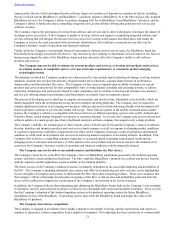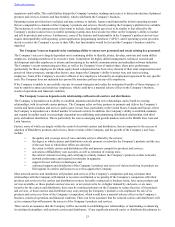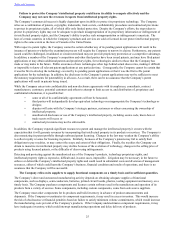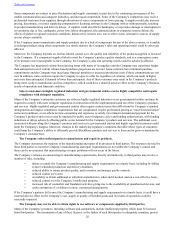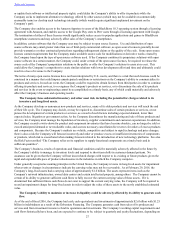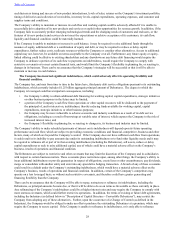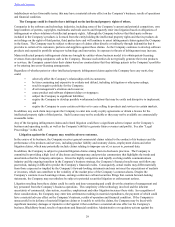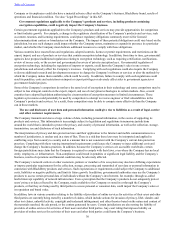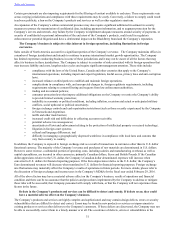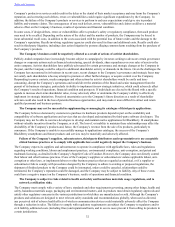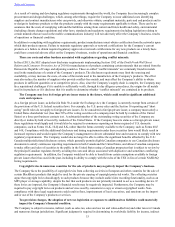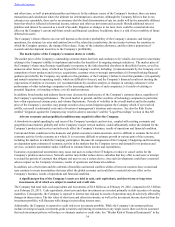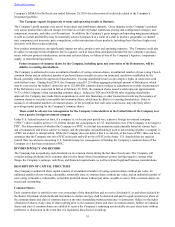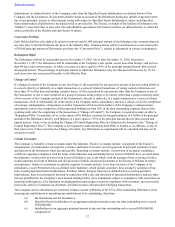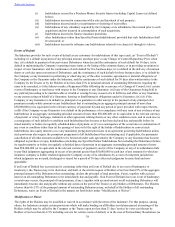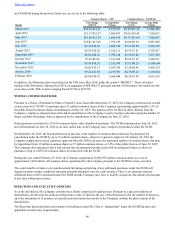Blackberry 2016 Annual Report Download - page 39
Download and view the complete annual report
Please find page 39 of the 2016 Blackberry annual report below. You can navigate through the pages in the report by either clicking on the pages listed below, or by using the keyword search tool below to find specific information within the annual report.
Table of Contents
30
Company or its employees could also have a material adverse effect on the Company’s business, BlackBerry brand, results of
operations and financial condition. See also “Legal Proceedings” in this AIF.
Government regulations applicable to the Company’s products and services, including products containing
encryption capabilities, could negatively impact the Company’s business.
Certain government regulations applicable to the Company’s products and services may provide opportunities for competitors
or limit industry growth. For example, a change to the regulatory classification of the Company’s products and services, such
as content, taxation, and licensing requirements, could place regulatory obligations commonly reserved for licensed
telecommunications carriers or broadcasters on the Company. The impact of these potential obligations could vary based on the
jurisdiction, but any such changes could impact whether the Company enters, maintains or expands its presence in a particular
market, and whether the Company must dedicate additional resources to comply with these obligations.
Various countries have enacted laws and regulations, adopted controls, license or permit requirements, and restrictions on the
export, import, and use of products or services that contain encryption technology. In addition, from time to time, governmental
agencies have proposed additional regulations relating to encryption technology, such as requiring certification, notifications,
review of source code, or the escrow and governmental recovery of private encryption keys. Governmental regulation of
encryption technology, including the regulation of imports or exports, could harm the Company’s sales in one or more
jurisdictions and adversely affect the Company’s revenues. Complying with such regulations could also require the Company
to devote additional research and development resources to change the Company’s software or services or alter the methods by
which the Company makes them available, which could be costly. In addition, failure to comply with such regulations could
result in penalties, costs and restrictions on import or export privileges or adversely affect sales to government agencies or
government funded projects.
Some of the Company’s competitors do not have the same level of encryption in their technology and some competitors may be
subject to less stringent controls on the export, import, and use of encryption technologies in certain markets. Also, several
countries have adopted legislation authorizing the circumvention of encryption measures in limited circumstances. These
legislative provisions could potentially be used by competitors to attempt to reverse engineer or find vulnerabilities in the
Company’s products and services. As a result, these competitors may be able to compete more effectively than the Company
can in those markets.
The use and disclosure of user data and personal information could give rise to liabilities as a result of legal, carrier
and other customer requirements.
The Company transmits and stores a large volume of data, including personal information, in the course of supporting its
products and services. This information is increasingly subject to legislation and regulations in numerous jurisdictions
around the world that is intended to protect the privacy and security of personal information, as well as the collection, storage,
transmission, use and disclosure of such information.
The interpretation of privacy and data protection laws and their application to the Internet and mobile communications in a
number of jurisdictions, is unclear and in a state of flux. There is a risk that these laws may be interpreted and applied in
conflicting ways from country to country and in a manner that is not consistent with the Company’s current data protection
practices. Complying with these varying international requirements could cause the Company to incur additional costs and
change the Company’s business practices. In addition, because the Company’s services are accessible worldwide, certain
foreign jurisdictions may claim that the Company is required to comply with their laws, even where the Company has no local
entity, employees, or infrastructure. Non-compliance could result in penalties or significant legal liability and the Company’s
business, results of operations and financial condition may be adversely affected.
The Company’s network carriers or other customers, partners or members of its ecosystem may also have differing expectations
or impose particular requirements for the collection, storage, processing and transmittal of user data or personal information in
connection with BlackBerry products and services. Such expectations or requirements could subject the Company to additional
costs, liabilities or negative publicity, and limit its future growth. In addition, governmental authorities may use the Company’s
products to access certain personal data of individuals without the Company’s involvement, for example, through so-called
lawful intercept capability of network infrastructure. Even a perception that the Company’s products do not adequately protect
users’ privacy or data collected by the Company, made available to the Company or stored in or through the Company’s
products, or that they are being used by third parties to access personal or consumer data, could impair the Company’s sales or
its reputation and brand value.
In addition, laws in various countries relating to the liability of providers of online services for activities of their users and other
third parties are currently being tested by a number of claims, which include actions for invasion of privacy, libel, slander, and
other tort claims, unlawful activity, copyright and trademark infringement, and other theories based on the nature and content of
the materials searched, the ads posted, or the content generated by users. Certain jurisdictions are also testing the liability of
providers of online services for activities of their users and other third parties. Any court ruling that imposes liability on
providers of online services for activities of their users and other third parties could harm the Company’s business.



